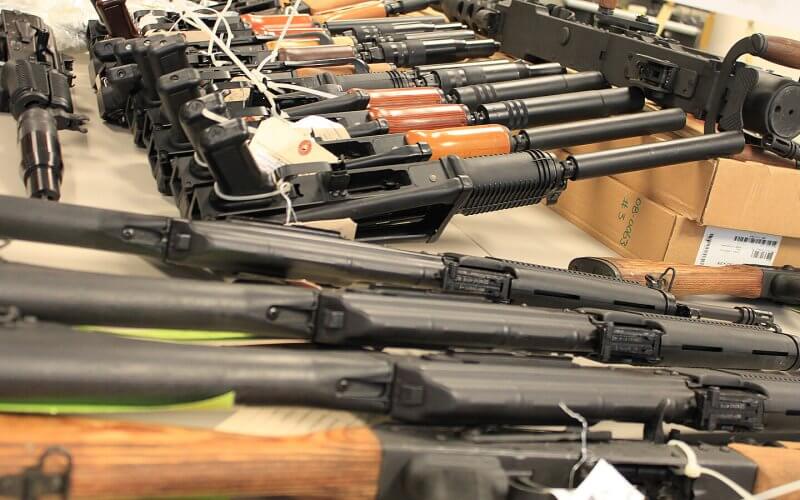While Americans have spent decades complaining about Mexican cartels trafficking illegal firearms across the border into the United States, a recent ruling by an appellate court has turned the tides and shined a light on a growing problem for Mexican citizens.
A U.S. appeals court ruled Monday that a $10 billion lawsuit filed by Mexico against American gun manufacturers can proceed. The appellate court ruled that the Mexican lawsuit “plausibly alleges a type of claim that is statutorily exempt” from a 2005 law known as the Protection of Lawful Commerce in Arms Act, known as the PCLAA, which only covers lawful firearm sales.
Such protections are now codified under 15 U.S.C. Section 105.
The ruling overturns a lower federal court ruling in 2022 that dismissed the claims of the Mexican government, setting the stage for a possible final showdown that will either reach the U.S. Supreme Court or go to trial.
The case stems from claims argued by the Mexican government, which has insisted that the ‘”flood” of illegal firearms coming across the border is the result of “deliberate” business practices by American firearm manufacturers.
The American firearm industry's trade association has denied the Mexican government’s claims. Some of the firearm manufacturers named in the lawsuit are Barrett, Beretta, Glock, Ruger, and Smith & Wesson.
Mexico has accused those manufacturers of engaging in a practice that results in the trafficking of tens of thousands of gins across the border into Mexico, empowering drug cartels with weaponry to fight one another and kill innocent civilians and government agents.
The Mexican government has alleged that as many as half a million firearms illegally cross their border each year.
Despite strict gun control laws, the Latin American country plunged into violence with more than 30,000 people being murdered during the past year.
According to a report published by the BBC, the entire country only has “one gun shop, housed in a Mexico City military complex.”
The case, which started in 2021 was originally filed in the U.S. District Court for the District of Massachusetts where many firearm manufacturers are located. Mexico’s complaint alleges that those companies knew their product was being sold to traffickers in the country, and as a result was escalating violence.
The lawsuit was initially dismissed by U.S. District Court Judge F. Dennis Saylor who ruled that the gun manufacturers were shielded under the PLCAA because that law protects such companies from damages “resulting from the criminal or unlawful misuse” of their firearms.
Mexico has since argued in its appeal in the 1st Circuit that the PLCAA is only applicable to domestic harm caused in the United States and does not protect U.S. companies from liability in Mexico.
The appellate court ruled that the complaint “plausibly alleges a type of claim that is statutorily exempt” from the act because it only covers lawful gun sales and the lawsuit is focused on the effects of illegal gun trafficking.
Gun control advocates and Mexican Foreign Minister Alicia Bárcena heralded the appellate court’s decision as “great news” on X, but gun manufacturers are saying the ruling is opening a flood gate to future lawsuits that could dangerously cross into the line of general enterprise liability for the gun industry.
“The Mexican government wins their appeal in U.S. court and is able to proceed with the lawsuit against U.S. gun companies for supplying weapons to cartels that fuels the bloodshed south of the border. An important legal step, but more court battles to come,” wrote Mexican journalist Ioan Grillo on X.
Mexico’s co-counsel, Jon Lowy, who also serves as president of the Global Action on Gun Violence acknowledged as much in a statement, saying that the appellate court’s decision was a “huge step forward in holding the gun industry accountable for its contribution to gun violence, and in stopping the flood of trafficked guns to the cartels.”
Lowy said the ruling “recognize[d] the right of another country to sue U.S. gun companies” and “pierced the unfair legal shield that gun companies have been hiding behind since 2005.”
Enterprise liability is a legal doctrine in which defendants can be held jointly liable for alleged harm because they are part of the same industry or enterprise. It is a form of secondary liability, which arises when a party substantially contributes to harmful acts carried out by another party.
The notion of using enterprise liability to sue gun manufacturers for killings in the United States has long been a dashed hope of gun control advocates who hope to hold the firearm industry for school shootings and other tragedies.
Arguments for and against such liability were explored in John Grisham’s 1996 novel, “Runaway Jury” in which the survivors of a Texas shooting event help orchestrate a successful enterprise liability case against a firearms company.
Lawyers for the firearms industry said the lawsuit was designed to unfairly blame American manufacturers for violence caused by Mexican cartels.
“Mexico should spend its time enforcing its own laws [and] bring Mexican criminals to justice in Mexican courtrooms, instead of scapegoating the firearm industry for their unwillingness to protect Mexican citizens,” tweeted National Shooting Sports Foundation (NSSF) general counsel Larry Keane.
The NSSF is an American firearms trade association that is representing the manufacturers in the lawsuit.
The appellate case was heard by Circuit Judges William Kayatta, Gustavo Gelpi and Lara Montecalvo. Judge Kayatta is scheduled to step down some time this year, which create a vacancy on the Boston based federal appellate court.
Related Story: Armed Group in Tactical Gear Kidnaps 14 Mexican Security Ministry Employees










